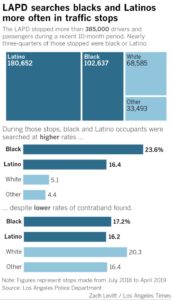LAPD Searches Blacks and Latinos More. But They’re Less Likely to Have Contraband Than Whites
Ben Poston and Cindy Chang, Los Angeles Times, October 8, 2019
Los Angeles police officers search blacks and Latinos far more often than whites during traffic stops, even though whites are more likely to be found with illegal items, a Times analysis has found.
The analysis, the first in a decade to calculate racial breakdowns of searches and other actions by LAPD officers after they pull over vehicles, comes amid growing nationwide scrutiny over racial disparities in policing.
{snip}
The Times analysis found that across the city, 24% of black drivers and passengers were searched, compared with 16% of Latinos and 5% of whites, during a recent 10-month period.
That means a black person in a vehicle was more than four times as likely to be searched by police as a white person, and a Latino was three times as likely.
Yet whites were found with drugs, weapons or other contraband in 20% of searches, compared with 17% for blacks and 16% for Latinos. The totals include both searches of the vehicles and pat-down searches of the occupants.
Racial disparities in search rates do not necessarily indicate bias. They could reflect differences in driving behavior, neighborhood crime rates and other factors.
But the lower contraband hit rates for blacks and Latinos raise serious questions about the law enforcement justification for searching them more often than whites, criminologists said.
{snip}
“We don’t pull people over based on race. We’re not supposed to do that,” Alikhan said. “It’s illegal. It’s unconstitutional. And that’s not the basis [on which] we do it.”
{snip}
The new findings follow a Times article published in January showing that the LAPD, including its elite Metropolitan Division, stopped black drivers at much higher rates than their share of the population.
According to the Times analysis of the new state data, black and Latino drivers and passengers were searched more often than whites in almost every part of the city.
Blacks and Latinos were more than three times as likely as whites to be removed from the vehicle and twice as likely to either be handcuffed or detained at the curb, the Times analysis found.
About 3% of blacks and Latinos stopped by the LAPD were arrested, compared with 2% of whites.
{snip}
Of the more than 385,000 drivers and passengers pulled over by the LAPD from July 1, 2018, through the end of April, 27% were black, in a city that is about 9% black. About 47% of those pulled over were Latino, which is roughly equivalent to their share of the population. About 18% of those stopped were white, when 28% of the city is white.
Asians, not including those of South Asian descent, made up about 4% of those stopped and 11% of the population. The LAPD searched 2% of Asian drivers and passengers who were pulled over.
An equipment violation, such as a broken taillight or tinted windows, was listed as the reason for more than 20% of vehicle stops involving blacks and Latinos, compared with 11% of stops involving whites, according to the Times analysis.
{snip}
Demographically, the LAPD closely mirrors the city: 49% of officers are Latino, 10% are black, 31% are white and 10% are Asian, according to department figures.
{snip}
Citywide in 2018, 43% of violent crime suspects were black and 40% were Latino, according to LAPD statistics. Experts say this does not justify the disparate search rates, because contraband is found less often on the groups that are searched more often.
“At its simplest level, it appears that blacks and Latinos are being subjected to a lower threshold of suspicion in order to be searched,” said Jack Glaser, a professor of public policy at UC Berkeley who has studied traffic stop data.
Glaser said the 24% search rate for African Americans raises questions about whether LAPD officers are targeting them because of their race.
“If you are searching a quarter of the people you’re stopping, you’re looking to search people,” he said. “You’re not just pulling people over for running stop signs and then happening to see they have a gun-shaped bulge in their pocket.”
{snip}
The gaps in search rates between blacks and whites in Los Angeles are wider than those found in other major California cities such as San Diego and Oakland, but smaller than San Francisco, according to the most recent reports available.
{snip}
















